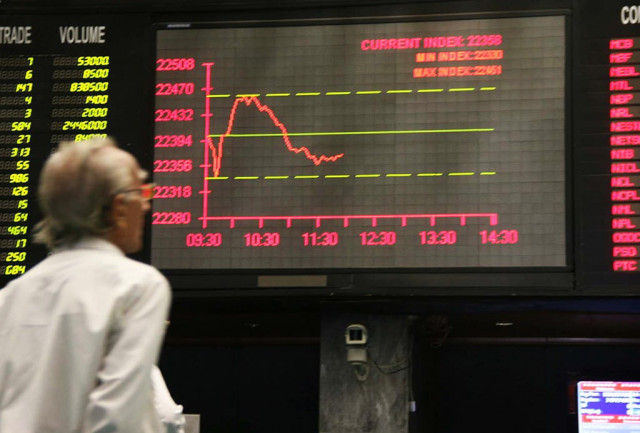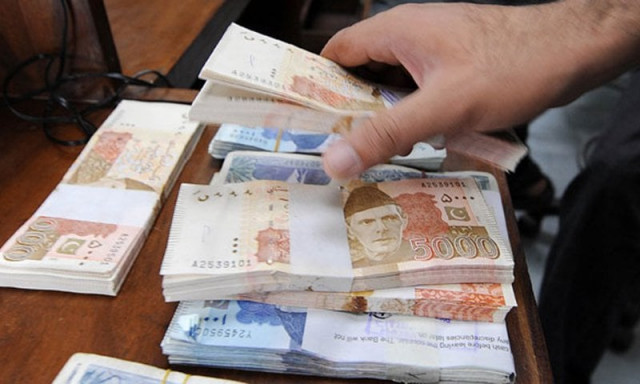Shares of 340 companies were traded. At the end of the day, 93 stocks closed higher, 233 declined and 14 remained unchanged. PHOTO: FILE
KARACHI:
The Pakistan Stock Exchange (PSX) witnessed a week of profit-taking and consolidation as investors remained cautious amid rising inflation, widening trade deficit and fiscal shortfalls. The benchmark KSE-100 index closed at 159,593, down 2,039 points, or 1.3% week-on-week (WoW), after recovering some ground on Friday.
On a day-on-day basis, following Friday’s strong rally, the PSX continued its upward trajectory on Monday as the KSE-100 index gained 1,172 points (+0.72%) to close at 162,803.
The market saw a consolidation phase on Tuesday, when the index fluctuated throughout the session, ultimately closing at 161,282, down 1,522 points, or 0.93%.
On Wednesday, the PSX endured a lacklustre session, slipping 1,704 points, or 1.06%, and settling at 159,578. The bourse extended its losing streak on Thursday and dropped another 481 points (-0.3%) to close at 159,097.
After three consecutive bearish sessions, the PSX finally saw some respite on Friday as the KSE-100 ended trading at 159,593 (+496 points, or 0.31%).
Arif Habib Limited (AHL) weekly review noted that the benchmark KSE-100 index continued on a downward trajectory at the start of the week, but bounced back on Friday, recovering some lost ground. The bearish trend was on the back of profit-taking and market consolidation. Consequently, the index closed the week at 159,593, marking a decline of 2,039 points (-1.3% WoW).
Among economic news, AHL mentioned, the Consumer Price Index (CPI) for Oct’25 came in at 6.2% year-on-year (YoY) – the highest since Oct’24 – compared to 5.6% in Sept’25.
In the Pakistan Investment Bond (PIB) auction, the government raised Rs785.2 billion against the target of Rs400 billion, with bids totalling Rs1.44 trillion. Cut-off yields rose 14-15 basis points for two to five-year papers, stayed flat for 10 years and fell nine basis points for 15-year bonds, which saw a large allocation of Rs340 billion.
In Oct’25, total cement dispatches increased 7.3% to 4.8 million tons, up from 4.4 million tons in Oct’24, driven by a surge in domestic demand. During 4MFY26, cement dispatches reached 17.3 million tons, depicting a 16.1% YoY growth from 14.9 million tons in 4MFY25.
Urea sales declined 2%, reaching 351k tons in Oct’25, driven by weak farm economics and seasonal impact, while di-ammonium phosphate (DAP) sales shrank 55% YoY to 140k tons due to lower imports and offtake by local producers.
Sales of oil marketing companies (OMCs), excluding furnace oil, rose 2% YoY to 1.47 million tons in October, fuelled by a 4% increase in high-speed diesel demand amid Rabi sowing and curbed smuggling, while motor spirit volumes dipped 2% YoY on higher prices. Cumulatively, 4MFY26 sales grew 8.3% YoY to 5.3 million tons, AHL added.
Syed Danyal Hussain of JS Global noted that stock market activity remained under pressure during the week, with the KSE-100 index closing at 159,593 points (down 1.3% WoW) as sentiment remained subdued due to unstable geopolitical dynamics.
On the economic front, the CPI for Oct’25 was recorded at 6.2%, which remained above market expectations, primarily due to flood-related supply interruptions and border closures with Afghanistan, lifting average inflation for 4MFY26 to 4.73%.
Meanwhile, the trade deficit widened 56% YoY in October to $3.2 billion, pushing the 4MFY26 deficit to $12.6 billion as imports rose to $6.1 billion, the highest monthly level since March 2022, while exports declined 4% YoY, Hussain said.
Conversely, remittances improved to $3.4 billion in Oct’25 (+12% YoY). The power-sector circular debt registered an increase of Rs79 billion in 1QFY26, reaching Rs1.69 trillion. On the fiscal side, the Federal Board of Revenue faced another monthly shortfall of Rs76 billion in Oct’25, which took the cumulative gap to Rs274 billion in 4MFY26, with total collections reaching Rs3.84 trillion, he added.






